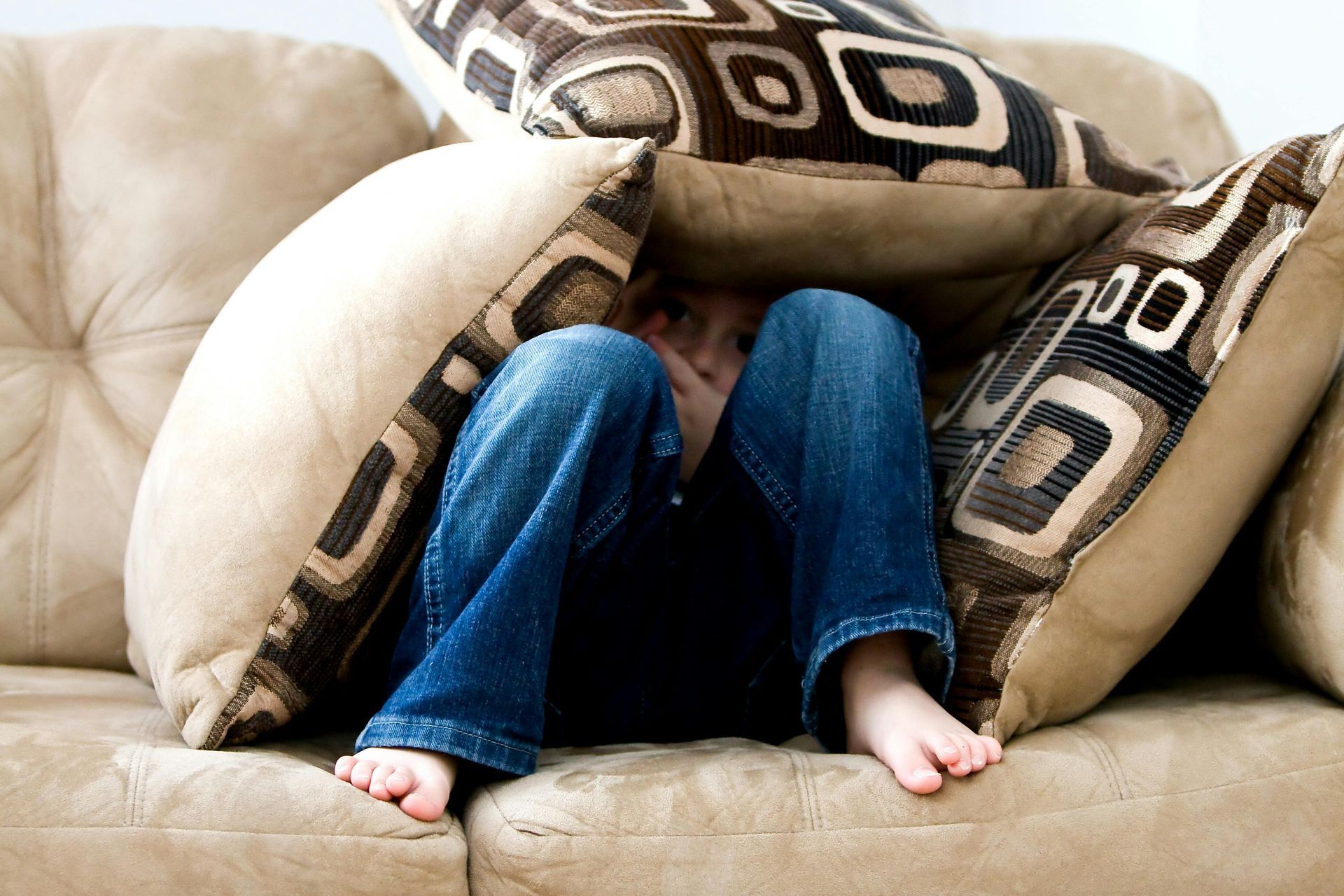Parenting Through School Struggles
Natalie Raby • April 18, 2025
When school feels tricky I want to be sure home feels like a warm hug.
I have had the opportunity to sit on both sides of school struggles, both as an educator and a parent. I know firsthand how essential collaboration between school and home is to a child's success. I've been the teacher who had to broach a very sensitive issue with parents. I've also been the school counselor who had to inform parents of serious mental health and safety concerns. But nothing compares to being the parent.
This week has been filled with emails back and forth for one of my children. We are so lucky to have the world's best teacher in a classroom with far less students than the national average. This teacher goes out of their way to accommodate our child, instill a deep sense of belonging in them, and maintain open communication about it all with us. Teachers like this one are magical.
This week has been hard for us as parents. This week has been challenging (no doubt) for this teacher. BUT the week has been devastating for our child. The emotional dysregulation they must have been feeling to cause the behavior that occurred must have felt so awful! I can imagine myself in their shoes feeling the injustice, unfairness, and anger and lashing out in an attempt to be heard.
Does my child's emotional dysregulation justify their actions? Absolutely not!
Does it warrant punishment? Absolutely not!
My child is great at naming their emotions (when prompted) and naming a strategy or tool to use to regulate (when prompted), but they cannot YET navigate emotional regulation on their own. That YET is the magic of growth mindset. It's not that they cannot do it, it's just that they have YET to master the skill.
This is why punishment is not the answer. Punishment does not teach. Punishment shames and blames and provides no path forward.
I've worked with many parents over my more than 20 years in education who resort to punishment to address school-related issues. On the surface this may seem like a great way to reinforce that school and home are a team, but it can really leave a child feeling like they have no safe space. Shouldn't a child's home feel like the safest place of all? For my children, I want home feel like respite. I want my presence to feel like safety. When something bad happens, I want my children to think of home as the place where we work through things together.
That's why even though this week has been filled with concerning emails from school there has been no punishment at home.
I think it's also important to note there has been no punishment at school. We are also very lucky to be part of a school that believes in restoration and consequences instead of punishment. Has our child missed a few recesses? Yes, but not as punishment, instead it was used as time to have a restorative conversation with skilled staff who have guided our child through reflection and repair.
So if school isn't punishing and neither are we, what the heck are we doing?
Regulating first.
I won't lie, I have felt very upset and frustrated this week, but I have to regulate my own emotions first. Deep breathing, visualization, and baking have been my strategies. I want to be sure I am calm and emotionally regulated before I attempt to co-regulate with my child. Plus, I think a treat can help improve any situation!
Being present.
I get as close as I can to my child. Sometimes they like to sit on my lap, other times they prefer to sit next to me. My close proximity helps them feel connected, regulated, and safe.
Listening.
I read the school emails to my child. I listen as they tell me what happened and how they felt. "I hear you saying you were so mad!"
Empathize.
I empathize with them. I let them know their feelings make sense. "I have felt like that before too."
Getting curious.
I ask questions to invite them to reflect. "What were you thinking when they said that to you?" and "How did you feel after you pushed them?"
Exploring alternatives.
We talk about getting into our pretend time machine and going back to redo the situation. It's amazing how many different ways they can come up with handling the situation in a more peaceful and safe way. "If you had gone to the back of the line instead what do you think would have happened next?"
Practicing.
We practice the scene where I play the other child and they play themselves or vise versa. Laughing and play should be part of all learning. We laugh and play while we practice. Sometimes I use silly voices or say silly things. Practice is essential because my child has YET to master the skills needed to handle these peer situations in any way other than the one that prompts a concerning email!
Acknowledging attempts.
Any and all attempts to use strategies and tools to stay emotionally regulated are acknowledged.
They took a deep breath before responding to a sibling? Acknowledge! "I noticed you took a big belly breath before you answered your sister."
They asked calmly for a few more minutes to finish playing? Acknowledge! "I heard you use a calm voice to ask for a few more minutes of play time."
They have a calm, safe body? Acknowledge! "I'm noticing your calm, safe body right now."
This acknowledgement helps raise self-awareness for them, reinforces our attunement to their emotions, and builds connection. This acknowledgement says to them, "I see you!"
HOWEVER, this is not a magical cure.
Spending time at home doing these things with my child is not going to guarantee that next week will be magically better. Emotional regulation takes modeling from grown-ups as well as time for them to practice for it to feel more automatic. All emotions are welcome and as a result our nervous systems will be triggered from time to time. Practicing emotional regulation allows for us to meet our dysregulation with understanding. It's only when we understand how we are feeling that we can begin to gain control of our thoughts and actions.
For now I will collaborate with his teacher to advocate for his needs at school and continue to make home feel like a warm hug where we work through problems together and believe in the power of YET!

I think this is pure POPPYCOCK! Not only is it unattainable, it's unsustainable and unnecessary. It isn't what our kids need from us, and it shouldn't be what we expect of ourselves. In parenting, the "hustle culture" leads to devastating consequences like burnout, emotional dysregulation, insecure attachment, and loss of connection. In short, it's a recipe for disaster! Perfection is an illusion. They don't need us to do all the things all the time. They need us to be present, connected, well-rested, playful, and emotionally regulated. We need us to be all these things too! The "hustle culture" pops up in the summer with parents rushing their kids from one carefully curated Instagram-worthy adventure to another. It pops up in the multiple after-school activities that leave little to no downtime for anyone to rest and connect. It's completely okay to keep it simple. I've got 3 things for you to consider if you've found yourself in the "hustle culture" and can't find the exit... Providing downtime for our kids to feel bored is important. Boredom provides opportunities to foster creativity, problem-solving, and emotional regulation. Family mealtimes are important. Sharing meals provides opportunities to foster communication, model manners and etiquette, and builds connection. Secure attachment with your kids relies on our ability to spend quality time with them. Secure attachment is all about relationship and connection. We have to spend quality time with them each day to ensure a secure attachment. Unfortunately, the "hustle culture" is reinforced in our society, but we can choose to say POPPYCOCK and exit! I encourage you to reflect on how you spend your days. Do you and your kids have downtime to get bored, eat together, and foster secure attachment? If not, I encourage you to look for ways to do less so you can find joy in connection.

The sudden cliff dive from consistent daily routines, stimulation, and socialization can take a toll on children and parents alike. The pressure to take grand vacations, make grand plans, and have a grand time doing it all can feel suffocating. Social media would have us believe that a breezy summer is as easy as creating a cute chart of activities, organizing some crafts, and letting them play outside. The truth for many of us is that summer is filled with stress, unfulfilled expectations, and disappointment. So, if the answer isn't a chart and some stuff to do, what's the solution to this impending doom summer brings? 1. Prioritize self-care - maybe you're surprised I listed this as the first thing, but let's be honest...if we aren't taking care of ourselves, we won't have the physical or mental energy to navigate tricky situations and all the emotions that go along with it. Set time aside every day. Yes! Every day to do something just for you. Summer is for you to enjoy as well! 2. Practice regulating your emotions - when we regulate our emotions, we are modeling for our children while keeping our lids on and our tempers calm. Use your strategies like belly breathing, sucking on an ice cube, or shaking out your body to release the emotion and return to regulation. **Read my blog post, Dysregulation Station, for more information. 3. Collaborate - make summer fun everyone's job. Have a family meeting to hear from them what they hope to do this summer. You might hear some wildly grand and unrealistic plans, it's a great opportunity to collaborate on how you could take the grand and make it realistic. Here's one of my favorites from my 13-year-old son: "I want to dig a 12 ft. x 12 ft. pit in our backyard to create an underground bunker." Sounds so cool, right? Unfortunately, having a giant pit in our backyard is not safe, so we collaborated to come up with something similar that would be safe. He's decided he'll attempt to create a fort using fallen logs from the forest and some old pallets. 4. Keep it simple - a fun summer doesn't have to be grand, it can be simple and cheap! We use theme days to keep things simple, predictable, and fun. Think "Movie Monday" where you watch a movie with dinner, "Takeout Tuesday" where you eat out and no one has to do dishes, or "Water Wednesday" where you set up the slip-n-slide or go to the community pool, the possibilities are endless. 5. Douse things in playfulness - not just a sprinkle, but a liberal dousing is called for! Take the summer to lean into fun and play. Let the to-do list loosen to prioritize connection. Tap into your inner child and aim to giggle and be silly as much as possible. A few summers ago, we surprised our children with dessert before dinner. The kids thought we had lost our minds, but they loved it and still talk about it. It's definitely in the plans for this summer! Play tag, go on bike rides, have dance parties, and make having fun with your children your highest priority. If you prioritize your needs, practice emotional regulation, collaborate as a family, and keep it simple and playful, your summer will be full of joy, connection, and fun!

Before we dig in, I want to set some things straight... 1. Lying is a behavior. Your child is not a liar, but they may struggle with lying behavior. Too often, we label a child based on the undesirable behavior we see, but that's just name-calling in my opinion. If we know that all behavior communicates an unmet need, then lying communicates your child's unmet need. Name-calling or labeling won't help you determine what drives the behavior. 2. Lying can start as early as two or three years old. This is good news! It's a developmental milestone that demonstrates a child's ability to comprehend that others can't read their mind. Toddlers are generally lying to avoid punishment or to communicate wishful thinking. 3. How a parent responds to lying can determine whether lying is simply a developmental milestone or the behavior continues. I know this is hard to come to terms with, but we have just as much to do with the lying as the child does. Punishment doesn't teach , it only instills anxiety, fear, and shame. And if a child is anxious or fearful of their parent's response, they'll be more likely to lie again! I think my lying behavior grew from a very active imagination and lots of wishful thinking. Stories have been told about me lying from a very young age. I lied about anything and everything. As I got older, my lying grew to be more than mere wishful thinking and imagination, it became a way to avoid punishment. I remember the shame, guilt, and self-hate that came from my lying behavior. My parents didn't have the understanding or skills to use discipline instead of punishment. So the cycle continued. I would do something, my parents would get mad, and I would be afraid and anxious, so I would lie to avoid punishment. I came to believe I was a liar, it was a label I internalized. I am proud to say I am no longer a lying liar who lies, although I know now I was never a liar. Lying was a defense mechanism I used to manage my fear and anxiety about my parents' behavior and avoid punishment Maybe you're wondering what you can do to avoid causing fear and anxiety in your child. I have some things you can do instead. Let's use a recent example from one of my children: They went to play at a friend's house. They left their friend's house to play at another friend's house about a mile away. The expectation in our family is to check in with parents before changing the plan. 1. Get curious - when your child tells a lie, get curious, not upset Think, "What is my child's lie telling me?" Is it wishful thinking? Is it avoidance? I thought, "Why didn't my child tell me when I picked them up?" 2. Don't use entrapment - don't ask your child a question you already know the answer to. Instead of saying, "Did you walk to A's house after I dropped you at B's house?" I said, "You walked to B's house without checking in first. Why didn't you tell me when I picked you up?" 3. Make it safe to be honest - allow children to make mistakes and appreciate their honesty. We also have to model what we expect, so be honest and take responsibility for mistakes "Thank you for telling me. We all forget what we need to do sometimes. We want you to be safe, which is why you have to check in before changing the plan." 4. Collaborate to find solutions - work together with them to find a way to make things right Here are the solutions we found: Option 1) when they play at a friend's house, they will have set check-in times Option 2) we will communicate with the friend's parent that they are not allowed to change locations. **It's important to consider your child's age and ability when determining solutions. This is not a great solution for a younger child, but for this middle schooler, it feels like a good fit. **Consult with your pediatrician if lying feels like a behavior bigger and more intense than what is typical. Trust your gut! Here are 6 takeaways I hope this post has heartened you with: 1. Lying in children is normal and expected 2. Lying is a behavior, and all behavior communicates needs 3. Punishment is not the answer to lying behavior (or any other behavior) 4. Be curious about why they are lying, but don't interrogate 5. Make it safe to tell the truth and model honesty 6. Work with your child to find a solution

